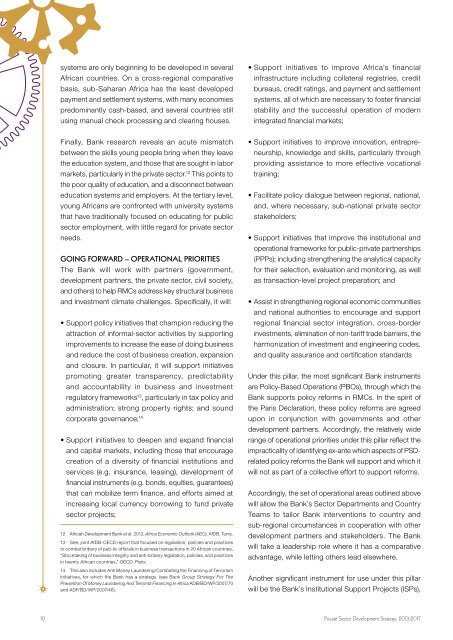2013-2017_-_Private_Sector_Development_Strategy
2013-2017_-_Private_Sector_Development_Strategy
2013-2017_-_Private_Sector_Development_Strategy
Create successful ePaper yourself
Turn your PDF publications into a flip-book with our unique Google optimized e-Paper software.
systems are only beginning to be developed in several<br />
African countries. On a cross-regional comparative<br />
basis, sub-Saharan Africa has the least developed<br />
payment and settlement systems, with many economies<br />
predominantly cash-based, and several countries still<br />
using manual check processing and clearing houses.<br />
• Support initiatives to improve Africa’s financial<br />
infrastructure including collateral registries, credit<br />
bureaus, credit ratings, and payment and settlement<br />
systems, all of which are necessary to foster financial<br />
stability and the successful operation of modern<br />
integrated financial markets;<br />
Finally, Bank research reveals an acute mismatch<br />
between the skills young people bring when they leave<br />
the education system, and those that are sought in labor<br />
markets, particularly in the private sector. 12 This points to<br />
the poor quality of education, and a disconnect between<br />
education systems and employers. At the tertiary level,<br />
young Africans are confronted with university systems<br />
that have traditionally focused on educating for public<br />
sector employment, with little regard for private sector<br />
needs.<br />
Going Forward – Operational Priorities<br />
The Bank will work with partners (government,<br />
development partners, the private sector, civil society,<br />
and others) to help RMCs address key structural business<br />
and investment climate challenges. Specifically, it will:<br />
• Support policy initiatives that champion reducing the<br />
attraction of informal-sector activities by supporting<br />
improvements to increase the ease of doing business<br />
and reduce the cost of business creation, expansion<br />
and closure. In particular, it will support initiatives<br />
promoting greater transparency, predictability<br />
and accountability in business and investment<br />
regulatory frameworks 13 , particularly in tax policy and<br />
administration; strong property rights; and sound<br />
corporate governance; 14<br />
• Support initiatives to deepen and expand financial<br />
and capital markets, including those that encourage<br />
creation of a diversity of financial institutions and<br />
services (e.g. insurance, leasing), development of<br />
financial instruments (e.g. bonds, equities, guarantees)<br />
that can mobilize term finance, and efforts aimed at<br />
increasing local currency borrowing to fund private<br />
sector projects;<br />
12 African <strong>Development</strong> Bank et al. 2012. Africa Economic Outlook (AEO). AfDB. Tunis.<br />
13 See, joint AfDB-OECD report that focused on legislation, policies and practices<br />
to combat bribery of pub-lic officials in business transactions in 20 African countries,<br />
“Stocktaking of business integrity and anti-bribery legislation, policies, and practices<br />
in twenty African countries,” OECD. Paris.<br />
14 This also includes Anti Money Laundering/Combating the Financing of Terrorism<br />
initiatives, for which the Bank has a strategy. (see Bank Group <strong>Strategy</strong> For The<br />
Prevention Of Money Laundering And Terrorist Financing In Africa ADB/BD/WP/2007/70<br />
and ADF/BD/WP/2007/46).<br />
• Support initiatives to improve innovation, entrepreneurship,<br />
knowledge and skills, particularly through<br />
providing assistance to more effective vocational<br />
training;<br />
• Facilitate policy dialogue between regional, national,<br />
and, where necessary, sub-national private sector<br />
stakeholders;<br />
• Support initiatives that improve the institutional and<br />
operational frameworks for public-private partnerships<br />
(PPPs); including strengthening the analytical capacity<br />
for their selection, evaluation and monitoring, as well<br />
as transaction-level project preparation; and<br />
• Assist in strengthening regional economic communities<br />
and national authorities to encourage and support<br />
regional financial sector integration, cross-border<br />
investments, elimination of non-tariff trade barriers, the<br />
harmonization of investment and engineering codes,<br />
and quality assurance and certification standards<br />
Under this pillar, the most significant Bank instruments<br />
are Policy-Based Operations (PBOs), through which the<br />
Bank supports policy reforms in RMCs. In the spirit of<br />
the Paris Declaration, these policy reforms are agreed<br />
upon in conjunction with governments and other<br />
development partners. Accordingly, the relatively wide<br />
range of operational priorities under this pillar reflect the<br />
impracticality of identifying ex-ante which aspects of PSDrelated<br />
policy reforms the Bank will support and which it<br />
will not as part of a collective effort to support reforms.<br />
Accordingly, the set of operational areas outlined above<br />
will allow the Bank’s <strong>Sector</strong> Departments and Country<br />
Teams to tailor Bank interventions to country and<br />
sub-regional circumstances in cooperation with other<br />
development partners and stakeholders. The Bank<br />
will take a leadership role where it has a comparative<br />
advantage, while letting others lead elsewhere.<br />
Another significant instrument for use under this pillar<br />
will be the Bank’s Institutional Support Projects (ISPs),<br />
10 <strong>Private</strong> <strong>Sector</strong> <strong>Development</strong> <strong>Strategy</strong>, <strong>2013</strong>-<strong>2017</strong>


